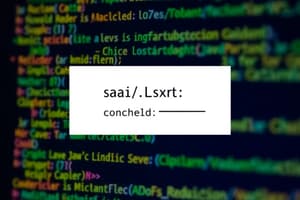Podcast
Questions and Answers
What are the three properties of a variable in Java?
What are the three properties of a variable in Java?
- Value, allocation, name
- Value, type, identifier
- Location, category, reference
- Memory location, data type, name (correct)
Which of the following is NOT a Java primitive data type?
Which of the following is NOT a Java primitive data type?
- Float
- String (correct)
- Byte
- Long
What is the result of the expression $14 / 4$ in Java?
What is the result of the expression $14 / 4$ in Java?
- 3 (correct)
- 3 with a remainder of 2
- 4
- 3.5
Which operator is used for multiplication in Java?
Which operator is used for multiplication in Java?
What is a method in Java?
What is a method in Java?
What are the numeric data types in Java?
What are the numeric data types in Java?
Which part of a method defines the access type of the method?
Which part of a method defines the access type of the method?
What is the data type of the value returned by a method with no return value?
What is the data type of the value returned by a method with no return value?
What is the purpose of a parameter in a method?
What is the purpose of a parameter in a method?
How would you call a method m1 from class A in another class B?
How would you call a method m1 from class A in another class B?
What is used to declare an effectively constant variable in Java?
What is used to declare an effectively constant variable in Java?
How are Java constants typically declared?
How are Java constants typically declared?
What symbols are used to indicate comments in Java?
What symbols are used to indicate comments in Java?
Which characters can be used in Java identifiers?
Which characters can be used in Java identifiers?
What is the role of an identifier in Java?
What is the role of an identifier in Java?
Which keyword precedes package identifiers in Java?
Which keyword precedes package identifiers in Java?
Which of the following is a correct example of variable initialization in Java?
Which of the following is a correct example of variable initialization in Java?
What is the result of the expression $20 ext{ % }3$ in Java?
What is the result of the expression $20 ext{ % }3$ in Java?
Which of the following is a Java primitive data type?
Which of the following is a Java primitive data type?
In Java, which keyword precedes package identifiers?
In Java, which keyword precedes package identifiers?
What is the role of an identifier in Java?
What is the role of an identifier in Java?
What are the three properties of a variable in Java?
What are the three properties of a variable in Java?
Which of the following is NOT a part of a method in Java?
Which of the following is NOT a part of a method in Java?
What is the role of a static variable declared with the final modifier in Java?
What is the role of a static variable declared with the final modifier in Java?
How are comments indicated in Java?
How are comments indicated in Java?
What is the purpose of an identifier in Java?
What is the purpose of an identifier in Java?
Which characters are allowed in Java identifiers?
Which characters are allowed in Java identifiers?
What are Java constants typically declared in?
What are Java constants typically declared in?
What is the result of the expression $9.0 / 2$ in Java?
What is the result of the expression $9.0 / 2$ in Java?
Which keyword precedes package identifiers in Java?
Which keyword precedes package identifiers in Java?
In Java, what does the modifier 'void' indicate for a method?
In Java, what does the modifier 'void' indicate for a method?
Study Notes
Variables in Java
- A variable in Java has three properties: data type, variable name, and value.
- The data type determines the type of value a variable can hold.
- The variable name is a unique identifier for the variable.
- The value is the actual data stored in the variable.
Primitive Data Types in Java
- byte, short, int, long, float, double, boolean, char are the numeric and boolean primitive data types in Java.
- String is not a primitive data type in Java.
Arithmetic Operations in Java
- The / operator is used for division in Java.
- The $14 / 4$ expression in Java results in 3 (integer division).
- The $20 % 3$ expression in Java results in 2 (modulus operator).
- The $9.0 / 2$ expression in Java results in 4.5 (floating-point division).
- The * operator is used for multiplication in Java.
Methods in Java
- A method in Java is a block of code that can be called multiple times from different parts of a program.
- A method has a name, return type, parameters, and a body.
- The access type of a method is defined by the access modifier (public, private, etc.).
- A method with no return value has a return type of void.
- Parameters in a method are used to pass values to the method.
- To call a method m1 from class A in another class B, an object of class A needs to be created, and then the method can be called using the object.
Constants in Java
- An effectively constant variable in Java is declared using the final keyword.
- Java constants are typically declared using the final static keywords.
- Comments in Java are indicated using // for single-line comments and /* */ for multi-line comments.
- Java identifiers can contain letters, digits, _, and $, but cannot start with a digit.
- The role of an identifier in Java is to name a variable, method, or other programming element.
- The keyword package precedes package identifiers in Java.
Method Declaration in Java
- A method declaration in Java specifies the method's name, return type, parameters, and access type.
- The void keyword indicates that a method does not return a value.
- A static variable declared with the final modifier in Java is a constant and cannot be changed once initialized.
- Variables in Java can be initialized using the assignment operator (=).
Studying That Suits You
Use AI to generate personalized quizzes and flashcards to suit your learning preferences.
Description
Test your knowledge on Java variable declarations and initializations. This quiz covers the basics of storing different types of data in memory locations using variables and their identifiers.




